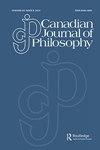Self-Determination and Secession: Why Nations Are Special
IF 1.7
2区 哲学
0 PHILOSOPHY
引用次数: 0
Abstract
Abstract In this paper, I consider the objection that unilateral secession by a national group (e.g., the Scots) from a legitimate, nonusurping state would wrong minority nationalities within the seceding territory. I show first that most proponents of this objection assume that the ground of the right to national self-determination is the protection of the group’s culture. I show that there are alternative justifications available. I then set out a version of this objection that does not rely on this claim; on this objection, a national minority that seceded and created its own state would commit an expressive wrong against minorities within the territory over which it claimed jurisdiction. I show that this objection is undermotivated: only under a specific set of circumstances would the minorities of the secessionist region be subject to an expressive wrong. Finally, I show that the correct way to think about the claims of minorities in secessionist regions is in terms of a claim to secure access to equal civic status such that they are not at risk of becoming justifiably alienated from their new state. If a secessionist group cannot provide this guarantee to the minority residents of their territory, then their seceding would commit wrongful harm, and the presumption in favour of collective autonomy is defeated. I call this defeater the ‘Alienation Defeater.’ With this in hand, we are now in a position to explain why nations are normatively special. Responding to the objections broached by Allen Buchanan and others, I show that even if other kinds of groups, such as religious groups, have the features in virtue of which nations have a claim to self-determination, this does not entail that those groups also have the right to secede. This is because an account of self-determination needs a list of ‘defeaters’—features in virtue of which a group’s claim to self-determination is defeated. I argue that religious groups are the strongest candidate for having a claim to collective autonomy in virtue of sharing many features with nations. I then argue that religious groups will run afoul of the Alienation Defeater; religious identity is too narrow to be the basis of the dominant collective identity of a state. This does not apply to nationality. This, I explain, is because of qualitative differences between religious groups, qua religious groups, and nations.自决与分离:为什么国家是特别的
在本文中,我考虑了这样一种反对意见,即一个民族团体(例如苏格兰人)单方面从一个合法的、非篡夺的国家分离出去,会错误地对待分离领土内的少数民族。我首先要说明的是,这一反对意见的大多数支持者认为,民族自决权的基础是保护该群体的文化。我指出还有其他的理由。然后,我提出了一个反对意见的版本,不依赖于这个说法;根据这一反对意见,一个脱离并建立自己国家的少数民族将对其声称管辖的领土内的少数民族犯下明显的错误。我认为这种反对是没有理由的:只有在特定的情况下,分离主义地区的少数民族才会受到表达性的错误。最后,我指出,考虑分离主义地区的少数民族要求的正确方法是,要求获得平等的公民地位,这样他们就不会有被新国家合理疏远的风险。如果一个分离主义集团不能向其领土上的少数居民提供这种保证,那么他们的分离将造成不正当的伤害,支持集体自治的假设就被击败了。我把这个失败者称为“异化失败者”。“有了这个,我们现在就可以解释为什么国家在规范上是特殊的。”在回应艾伦·布坎南(Allen Buchanan)等人提出的反对意见时,我指出,即使其他类型的群体,如宗教群体,具有民族要求自决的特征,但这并不意味着这些群体也有权分离。这是因为一个关于民族自决的论述需要一个“失败者”的名单——凭借这些特征,一个群体的民族自决主张被打败了。我认为,宗教团体是最有力的候选人,因为它们与国家有许多共同的特征。然后,我认为宗教团体将与异化反对者发生冲突;宗教认同过于狭隘,无法成为一个国家主导集体认同的基础。这不适用于国籍。我解释说,这是因为宗教团体、准宗教团体和国家之间存在质的差异。
本文章由计算机程序翻译,如有差异,请以英文原文为准。
求助全文
约1分钟内获得全文
求助全文

 求助内容:
求助内容: 应助结果提醒方式:
应助结果提醒方式:


